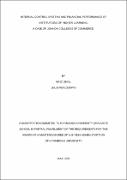| dc.contributor.author | Okol, Eric | |
| dc.date.accessioned | 2022-02-10T06:51:14Z | |
| dc.date.available | 2022-02-10T06:51:14Z | |
| dc.date.issued | 2021-05 | |
| dc.identifier.citation | Okol, Eric (2021) Internal control systems and financial performance of institutions of higher learning: a case of Uganda colleges of commerce. | en_US |
| dc.identifier.uri | https://kyuspace.kyu.ac.ug/xmlui/handle/20.500.12504/460 | |
| dc.description | xiii,82 p | en_US |
| dc.description.abstract | The study examined the influence of internal control systems on the financial performance of institutions of higher learning with specific consideration of Uganda College of Commerce. The study specifically focused on addressing three objectives which included; to examine the influence of information and communication on financial performance of UCCs, to assess the internal control environment on financial performance of UCCs and to investigate the influence of internal control activities on the financial performance. The study was guided by the Principal- Agency Theory to conceptualize the variables as used in the study. The study adopted a case study research design that utilized both quantitative and qualitative approaches. Simple random sampling technique was used to select a sample of 120 out of a population of 123 respondents. Both questionnaire and interview methods were used to collect data from staff of Tororo, Aduku and Soroti. In the study, analysis was done at different levels first with descriptive statistics and linear regression analyses were conducted to address the study objectives. The study established that information and communication systems, internal control environment and internal control activities all had a significant influence on financial performance of UCCs. The study therefore concluded that internal control systems collectively predict the amount of variance in financial performance of institutions with those institutions that improve on information and communication, develop favorable internal control environment and improve on internal control activities are likely to register an increase in financial performance. The study recommended that efforts should be put in place to enable a communication system that allows free and effective movement of information among the staff and also draw strategies on how confidential information would be kept without leaking and also electronic information should be kept safely to avoid distortion by opportunistic staff, staff from the accounting section should be introduced to a system that allows instant recording of the transactions as they occur for accountability purposes. The UCCs need to create a favorable environment for efficient execution of their duties to minimize fraud; efficient and effectiveness of performance including management integrity and ethics are emphasized and strongly adhered to. The management of UCCs should ensure that there exist effective and strong internal control activities and good financial policies, the right employees to enable segregation of duties. A labeling system should be introduced in the UCC’s to ensure that all assets procured are immediately labeled to avoid staff personalizing them and should be kept safely for all institutional use.
Key words: Information and Communication, Internal Control Environment, Internal Control Activities and Financial Performance | en_US |
| dc.language.iso | en | en_US |
| dc.publisher | Kyambogo University | en_US |
| dc.subject | Internal control systems | en_US |
| dc.subject | Financial performance | en_US |
| dc.subject | Institutions of higher learning | en_US |
| dc.subject | Colleges of commerce | en_US |
| dc.subject | Information and Communication | en_US |
| dc.subject | Internal control environment | en_US |
| dc.title | Internal control systems and financial performance of institutions of higher learning: a case of Uganda colleges of commerce | en_US |
| dc.type | Thesis | en_US |

